Volleyball drills for technique general
- Learning to pass to playmaker (position 2) with movement towards the ball.
- Line up at position 1.
- Players there have a ball in their hands.
- Player A plays to player B at position 3.
- Player A moves sideways to position 6.
- Player B plays the ball back to position 6.
- Player A plays the ball (preferably) BH to the korf basket at position 2.
- Player B catches the ball and joins the line at position 1.
- Player C moves into position player B.
- Player A moves to player C's position, position 3.
- On the other side of the net you can practice the same.
- Later on, alternate with player instead of basket, place of throw, position of return and position of pass.
- To learn to always pass to the distributor.
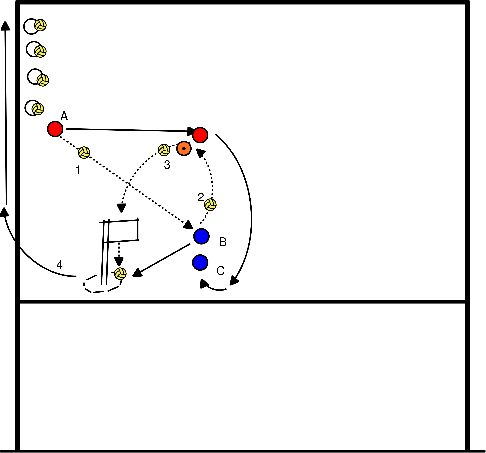
- On one side of the field there is a six in full formation.
- On the other side are 3 players.
- Behind the 3 players stand the servers.
- Exercise:
- Servers serve the ball, the 6 team defends this ball and plays out the rally.
- The 3-man team may defend and also rally.
- Point count:
- Service error, 1 point for the team that was set up.
- Ball on ground by the 3 team, point for the essayed team.
- Good service, but rally won by 3-player, point for 3-player.
- IF 3-TAL has 3 points three move on, if TEAM has 12 points, 3-tal and all servers must push up 5x.
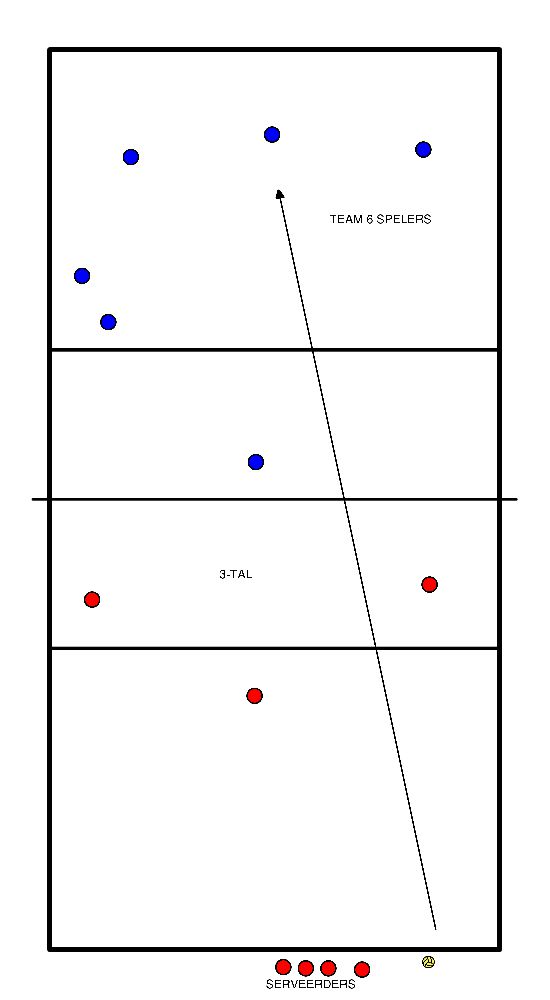
- This exercise can be done in 3 or 4 teams.
- Minimum number of players is 6 and maximum 8 per available field.
- In a 4-player team, two players on each side of the net.
- Use during the exercise half a net width per 3-4 team.
- In a 4-player team:
- 2 players on each side.
- The ball is thrown over the net at the start.
- Player A plays the ball for himself and at the 2nd contact he gives a set-up for player B.
- Player B tips the ball over the net with 1 hand.
- Player C plays the ball for himself and then gives a set-up for player D.
- D tips the ball over the net.
- After a team has played the ball over the net the players change places.
- In the case of a 3-player team:
- 2 players on one side of the net and the other player only on the other side.
- Player C has the ball and throws it over the net to the 2 team.
- Player A plays the ball for himself and at the 2nd contact he gives a set-up for player B.
- Immediately after giving the set-up, player A goes under the net.
- Player B tips the ball over the net with one hand.
- Player C plays the ball for himself and gives a set-up for player A.
- Player C goes to the other side of the net immediately after giving player A a set-up.
- Player A tips the ball over the net to player B.
- Player B plays the ball for himself and gives a set-up for player A.
- After giving the set-up player B goes under the net.
- Expansion:
- Possible mandatory blocking of tip ball by player not doing the passing.
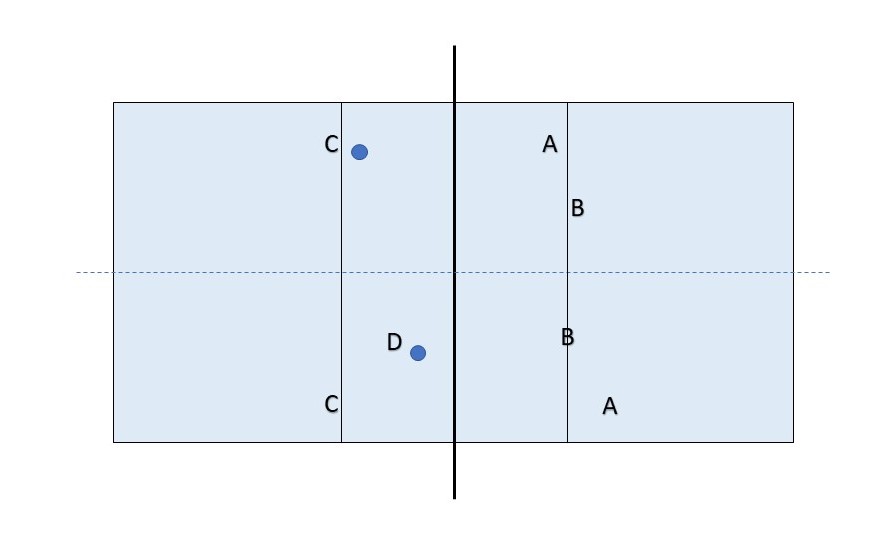
- Possible mandatory blocking of tip ball by player not doing the passing.
- Objective:
- Increase responsiveness.
- Place one player in the corner of the field.
- Have at least 4 players stand around him in a quarter circle.
- Each player has his own ball.
- Throw the ball in tempo (tight) on the knees of the player in the corner to pass back underhand.
- After passing, immediately throw the ball to the next player in the quarter circle.
- Player in the corner so consecutive balls in underhand pass back:
- Important to stay low.
- Expect the ball.
- Respond regardless.
- About 5 rounds and then replace the player in the corner.
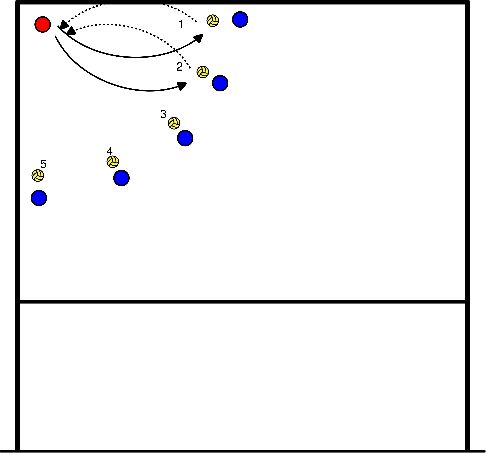
- Two players stand behind each other.
- About half a meter apart, facing the same way.
- Another player stands 3 or 4 meters away from them and has a ball and throws it to upper hand.
- The one who throws throws randomly on player 1 and 2.
- Player 1 or 2 calls loose if he thinks the ball is for him and plays overhand back.
- About 20 balls in a row.
- Then the group of 3 changes position until everyone has been there.
- After that again, but now without talking.
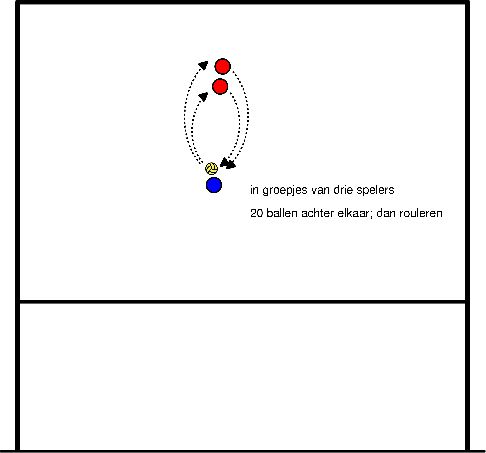
- 3 tally, that means the teams change every time, since there are 10 players.
- ATTENTION:
- Don't make a fuss when getting the players ready, I don't want to see the same teams every time. Everyone counts for himself.
- Trainer puts the ball in play, on the side where points are made, this can be done in different ways.
- Also, the ball is put into play at a high pace when the teams need to rotate.
- The trainer stands in the middle near the net.
- One player stands in the field.
- The trainer throws the balls all over the field.
- The player is only done when he/she has touched/played three balls in a row.
- When the player misses the second or third ball the trainer starts the count again.
- Exercise to make several quick movements in a row and play high enough.
- Every child stands with the ball one meter from the net.
- Throw the ball over the net with a forearm movement and catch it on the other side.
- Throw the ball over the net with an overhead movement and catch it on the other side.
- Throwing the ball over the net overhead and catching it for yourself at the other side with forearms.
- If necessary, make it more difficult by varying height and distance.
- Organisation:
- Trainer with ball carrier on P6.
- 1 player starts at P3.
- Other players stand around the field and take care of ball safety and returning the ball to trainer.
- Execution:
- Trainer throws the balls randomly into the field in a calm tempo.
- Player must try to play the ball, but must touch it as little as possible.
- After 10 times success change.
- Throwing the ball over the fence with pairs, overhead and underhand, meanwhile moving sideways:
- Each pair a minimum of 6 times throwing and moving the ball sideways - 2 rounds.
- Each pair to play the ball overhand at least 6 times - 4 rounds.
- Each pair to play the ball underhand a minimum of 6 times - 4 rounds.
- Each pair to play the ball with one arm at least 6 times - 1 round.
- When everything is over, start again until it's time.
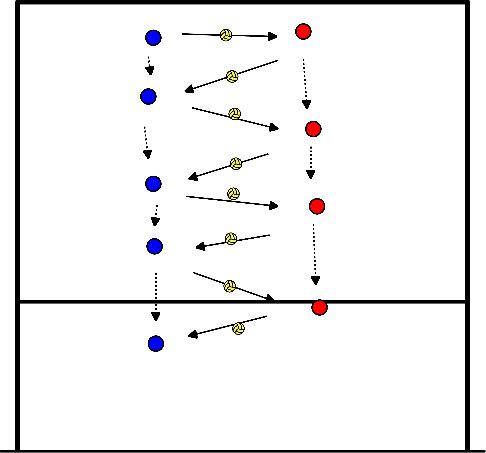
- Training for upping
- At position 4 (outside attack) korfball pole with hooptied . (with sturdy velcro)
- Upper at position 2get ready. (lay down dot)
- Reserve uppers in a line on position.
- Trainer at position 5, throws the ball to upper.
- He picks up the ball through the hoop.
- Behind that, an attacker is ready to catch the ball and puts it in the trainer's ballcar.
- Catch is in the line at position 6.
- Upper is going to catch.
- Variation:
- Uppercut back to outside position.
- Throw the ball from the other side and pass to position 2.
- Have the distributor step in from position 1.
- Points of attention when upping:
- Getting under the ball, the ball should fall on your forehead.
- Hands in the shape of the ball (make sure the hands are not too far to the side; like catching an inu)
- Right foot more forward than the left.
- Face towards position 4.
- At ball contact, slightly bend the knees and push out the ball, stretching the legs.
- When playing, the ball must remain in front of the upper. (Be careful not to arch your back)
- When uppercutting backwards, bend the back along with the uppercut.
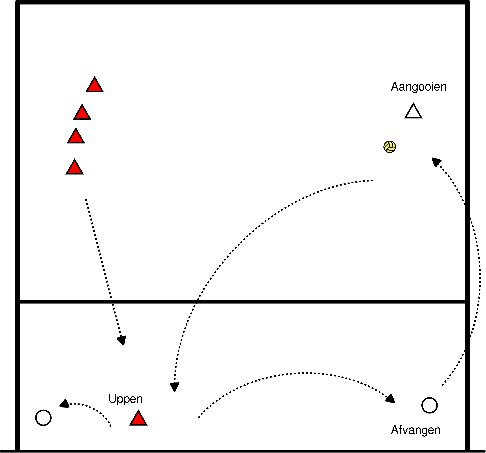
- 2 teams, whoever can move the mat the fastest across the field to the other side.
- They must all stay on the mat.
- Pass the ball overhead.
- A to C.
- C to B. (A runs to the front),
- B to D. (or A, depends on team size),
- D to A. (or C)
- The team that reaches the other side first wins.








